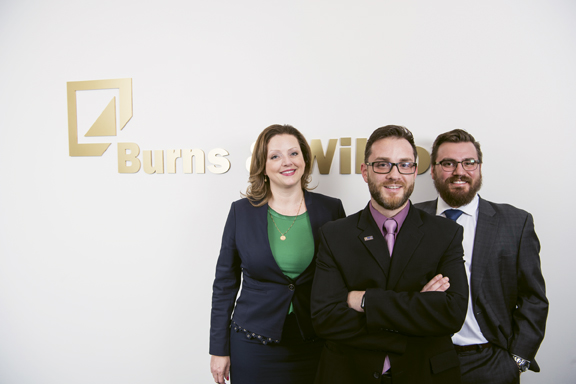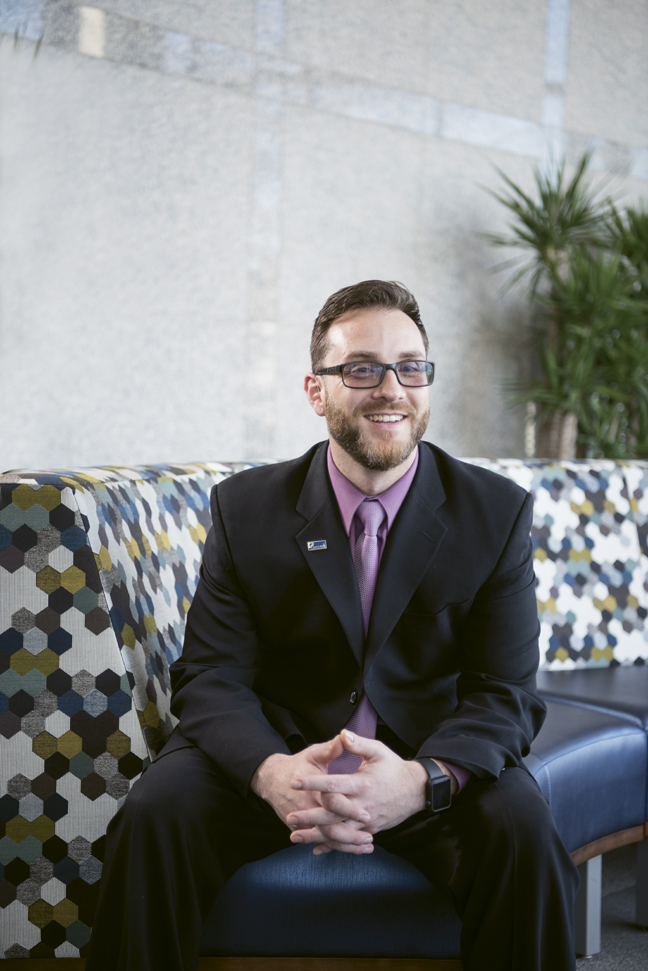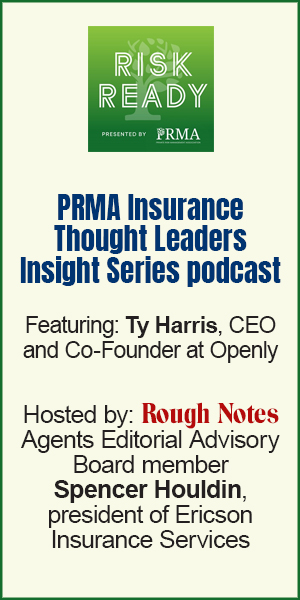Taking the “dis” out of disability
“The only thing worse than being blind is having sight with no vision.” —Helen Keller
From the time he was a small child dealing with hearing loss, Rick Poplin instinctively drew upon a “life vision” to succeed despite his difficulties. When his grandmother discovered that he was reading lips in the third grade, she saw to it that he was evaluated. The diagnosis: nerve damage. Even though he wore hearing aids, had auditory trainers and sat in the front row, Rick assumed that he could progress just as everyone else did. It would just take a bit of adaptability.
When he went out for football, he balked at special treatment. Wanting to accommodate for the hearing problem, “They hit me lighter. It drove me nuts. I was as good as anybody else.” In Rick’s mind, despite the disability, he had the ability—and the vision—to circumvent it.

-Rick PoplinCommercial Property/Casualty UnderwriterBurns & Wilcox
As many boys did in that day, he had a paper route. “I learned about money and responsibility,” he recalls. An innate art talent led him to Vincennes University, where he pursued a degree in commercial art and design. Although that degree was pushed into the background, it was to become an important part of his life later on.
He then “fell” into insurance, starting as an agent at Farmers, where he heard the mantra that if one works hard, “It will pay off for you and allow you to leave a legacy to your family.” That family now consists of wife Meagan (his childhood sweetheart), a 12-year-old daughter, and a 10-year-old son.
Another disability soon raised its ugly head when their then-18-month-old toddler son began to experience a series of illnesses that eventually were attributed to an auto-immune disease that required, among other things, surgery to remove necrotic tissue. “It has been touch and go all through the years,” says Rick.
In the midst of all of this, plus mounting medical bills, Rick managed to move ahead in the insurance industry, choosing to work at Burns & Wilcox as a commercial property/casualty underwriter. Upfront as always, Rick informed his boss of his limitations. Rebecca Roberts, ASLI, CPCU, TRS, associate vice president and managing director of the firm’s Indianapolis location, was confident about hiring him because of the reputation he brought. In addition she says, “He was open about wearing hearing aids and joked about that, (a typical ‘Rickism’).” But he assured her that his condition wouldn’t limit him. There might be the usual “adapting,” but there would be no lowering of standards. And there wasn’t.
Then it all hit the fan. And what followed is a tale of accommodation, a cooperative office culture, and a new—but undreamed venture.
Rick began to notice changes in his peripheral vision. Once, moving from the bright outside into a dark restaurant, “full of confidence and super excited” about some ideas that were dancing around in his mind, Rick walked into a counter and almost knocked it over. His companion joked, “Didn’t you see it?” He hadn’t. Neither did he see a chair in a dimly lit conference room. Finally, while sitting by the campfire during a family camping trip, he looked out and was unable to see anything. “I’m getting old,” he quipped to his wife. “You’re going to an optometrist,” she retorted.
“We need to look at something,” said the doctor during the exam. Recalls Rick, “He pulled out a cylinder, a glass thing, and put it in my eye, then said, ‘Hmm-m-m-m.’” Meagan looked concerned.
“If it’s what I think it is, and I hope it’s not,” ventured the doctor, “all we can do is give you vitamins.” An ophthalmologist concurred. Rick had Usher Syndrome, a rare disease that ultimately will take both his sight and hearing. The nerve deafness that Rick had endured for years had been an early symptom.

A new life
It was then that Rick realized that his entire life had been a preparation for this. As a child, he had been bounced from place to place, but he adapted. He couldn’t hear well, but he adapted. What he had unconsciously lived by matched something that Helen Keller had once declared: “The only thing worse than being blind is having sight with no vision.”
His life was to be the same life as hers, void of sight and sound. Just as she had done, he vowed to find the ability in the disability, to plow ahead, to continue to work, to contribute to his world and to thrive. “She was deaf and blind at the early age of two and spent most of her life fighting through the silence and darkness to accomplish so many great things and bring hope to so many. She is someone I admire and strive to be like every day. She motivates me to be above my disease,” he declares.
So Rick moved ahead, adapting and looking to the future. His first move was to be upfront with his boss, just as he had been about his hearing problem during his job interview. Fortunately for Rick, this was not an intimidating prospect. The Burns & Wilcox culture has always been one of accommodation, Rebecca points out. “As a family-owned company, we tend to know quite a bit about our employees and vice versa. There is an open dialogue here. We communicate our struggles and help one another.” In addition, the corporate office stands ready to provide benefits if that becomes necessary.
One of the greatest hurdles for Rick has been giving up driving. Part of his job responsibility involves visiting agencies each month. Rick turned that “problem” into a positive by arranging rides with fellow underwriters from other lines of coverage. “Because the company supports collaborative cross-selling,” points out Rebecca, “people would be teaming up anyway.” His disability became an ability to act in a reciprocal fashion. Someone drives Rick, and Rick provides that someone with an opportunity to cross-sell.
Most of all, however, Rick contributes and holds his own weight. “He and I have talked in the past as he walked through the diagnosis. He acknowledges that he must work hard and make allowances,” says Rebecca. “It is interesting to watch him try not to lower standards. He must be more proactive in his planning. He must coordinate his visits and put in a request for a team ahead of time. Will they be in the office? Will it be beneficial for others (a most important factor)? Other people could do this at the last minute; however, to meet the same requirement as his peers, Rick must be proactive in his planning and he has done that.”
Fellow employee Ben Riggs, an assistant underwriter in transportation who lives near Rick, has found that offering to drive him to and from work has proved to be a great benefit to himself. During those rides, Rick mentors the younger Ben, who appreciates that“he’s well-versed and extremely knowledgeable” about the insurance industry.
In addition, as a parent with 10 additional years of experience, Rick can share war stories from the home front. For example, Ben remembers, “He once joked, ‘I know all of the horrible children’s TV shows.’ He hears my ups and downs and turns it around. He’s just the most down-to-earth person I’ve ever met. He can find the positive in any negative situation.”

-Rebecca Roberts, ASLI, CPCU, TRS
Associate Vice President and Managing Director-Indianapolis
Burns & Wilcox
An unexpected opportunity
A valuable bit of serendipity can be attributed to the friendship that Rick and Ben have established. While attending a wedding, Ben met someone from the Joseph Maley Foundation and offhandedly mentioned that he worked at Burns & Wilcox and “picks up a guy who is losing his hearing and sight.”
“I would like to meet him,” was the reply.
The result? Rick and the foundation have become a perfect match, both in terms of his struggles and those of his son. The website (www.josephmaley.org) tells the foundation’s story: “Joseph Maley was a young man who accepted all without judgment. Born with physical and cognitive disabilities, and never having the ability to speak, he nonetheless touched others with his resilience, spirit, smile, and hugs. Joseph planted the seeds of acceptance in the individuals he encountered.
“Joseph passed away at age 18 from leukemia, but his legacy lives on through the Joseph Maley Foundation, started in 2008 by his parents—John and Vivian—and brothers—Tony, Dominic, Frank, and Gino. Established with the mission of serving children of all abilities, the foundation inspires individuals to accept and serve others.”
Their adaptation of the word “disability” to disABILITY clarified to Rick how he had been living his own life. In a recent Joseph Maley Foundation-sponsored talk to school children (his first venture into public speaking), he averred: “At the end of the day, I refuse to let my disease restrict me.”
Then, exhorting the youngsters to be like young Joseph Maley, Rick said, “I am hoping that at the end of the day, you will all ‘see’ the potentialand opportunities that people have who are visually and hearing impaired.” In addition, for those who suffer a disability: “Anything is possible if you put your mind to it and allow others to help you achieve a common goal.”
According to Courtney Basso, the foundation’s events and communications director, Rick was a hit. As a result, “We hope to pull him into the full circuit of speaking. Kids adore him. He has a natural ability to tailor his talks to different age ranges.”
Program Director Julie Friedman agrees: “You would think he had been doing this for years.”

-Ben Riggs
Assistant Underwriter, Transportation
Burns & Wilcox
Living now while thinking ahead
Rick shares: “I have decided to focus my time and energy on the things I can see and do now.” Harking back to his degree in art, he has taken up painting again “so that I can leave something behind.” Next up? Guitar lessons, because “I can always do that.” The memory of music will follow him into the silence. Camping and zip-lining in Brown County can continue into the dark days. Again: using one’s ability in order to overcome the disability. “Can’t” isn’t a word in Rick’s vocabulary.
Gallows humor occupies a curative place in the Poplin family. For example, their 12-year-old daughter once quipped, “I’m the only normal one in the house. What am I going to get?” And to the school children, Rick said, “I run into things, knock glasses off the table, knock people over, and completely miss things. Most of these things cause my family and me to laugh—except when I stub my toe or hit my shin. That hurts!!
“We can only manage it and live with it,” Rick concludes. Meagan echoes that sentiment. In addition to working in the activities department of a local nursing home, she manages to support two family members with disabilities and provide security for their daughter. However, Meagan would balk at being called the “rock” of the family. Rather, she says, “We take turns being the rock. When one is weak, the other is strong. We just do it.”
Rebecca speaks for everyone who knows Rick when she says, “I can always count on Rick to have a positive attitude. That means quite a bit when we are struggling with our own various situations. That is a very unique quality, considering the things that he is dealing with in his life.”
Rick would immediately turn those observations around to compliment an often-maligned insurance industry emphasizing how “open, caring and compassionate the industry is. In so many other industries, my job would have been eliminated. That’s humbling. I feel a part of something I wouldn’t have been a part of elsewhere. It makes me want to be better.”
The author
Alice Ashby Roettger is a freelance writer based in Indianapolis, Indiana. She also serves as an editorial assist






